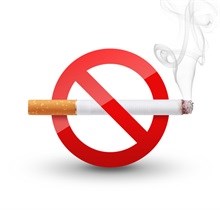
The WHO estimates that smoking is currently responsible for killing 1 in 10 adults worldwide, and it is the single most preventable cause of death globally. Sadly smoking does not only affect smokers, but also those around them. More than half a million people die annually from second-hand smoking, a third of them are children. Smokers are also likely to pass their habits on, with their children being more likely to become smokers than their peers were. Our National Department of Health confirms, there is no safe level of exposure to second-hand tobacco smoke.
The 2012 SA National Health and Nutrition Examination Survey found that 16% of South Africans were current smokers. This was an incredible improvement from 32% in 1993. The Government's tobacco-control policies, increased taxation, and raised awareness of the harmful effects of smoking had a massive impact on the country. Of course, we cannot stop here - with 80 million cigarettes, still being smoked every day in SA, the prevalence is still too high. Of particular concern is the high rate of smoking amongst school-aged children, which is estimated at 1 in 5.
Illicit cigarettes include any cigarettes that are unregulated, fake, sold as singles, or that skirt duties payable on tobacco sales. In a country where social inequality and poverty remains a reality, illicit cigarettes are the backdoor into smoking. These cigarettes are more affordable and more accessible, which makes them attractive for the youth as well as low-income groups. Illicit cigarettes hook young people into tobacco experimentation because they are more affordable and can be bought in small numbers. In addition, these cigarettes are not regulated and they do not contain health warnings to caution new users.
Dr Yusuf Saloojee of the National Council Against Smoking agrees in saying, "Cheap illegal cigarettes damage public health because it increases cigarette consumption. Smokers who might otherwise have quit as a result of high prices instead switch to cheaper illegal products."
Illicit cigarettes can be either imported illegally, 'fake' cigarettes, or unbranded original cigarettes. Cigarettes sold for R 18.00 or less per packet are most likely illicit, as are cigarettes sold as singles. Often the packaging will not contain the mandatory health warnings and helpline numbers required by law in South Africa. It is estimated that somewhere between 10% and 20% of cigarettes smoked in SA are illicit.
The HSFSA is asking the public to become part of the fight against illicit tobacco trade, alongside bodies such as the National Council Against Smoking fighting to close the door on illicit cigarettes. We as citizens can also play our part by not supporting illicit cigarette sales and by reporting illicit sales if we become aware of such activities. This may seem like a small thing to do, but it is an important step in winning the war against tobacco.
For more information, go to www.heartfoundation.co.za.